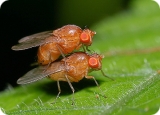seminar – Thursday 2nd October 2014
 Sexual selection in viscous populations
Sexual selection in viscous populations
Tommaso Pizzari, Edward Grey Institute, Department of Zoology, University of Oxford, Oxford
Thursday 2nd October 2014, 11AM, amphitheatre Monge
Competition over reproductive opportunities among members of one sex (sexual selection) often harms members of the opposite sex, creating a conflict of interest between individual males and females. This battle of the sexes has become a paradigm in the study of sexual selection and intersexual coevolution. In this seminar, I review recent theoretical advances suggesting that—as in any scenario of intraspecific competition—selfishness (competitiveness) can be strongly influenced by the genetic relatedness of competitors. When competitors are positively related (e.g., siblings), an individual may refrain from harming its competitor(s) and their mate(s) because this can improve the focal individual’s inclusive fitness. I then present recent experimental tests of these ideas in fruit flies (Drosophila melanogaster) and red junglefowl (Gallus gallus). I conclude by arguing that together these findings suggest that population structure is a potentially fundamental yet often overlooked factor in the study of the battle of the sexes.
- kc_data:
- a:8:{i:0;s:0:"";s:4:"mode";s:0:"";s:3:"css";s:0:"";s:9:"max_width";s:0:"";s:7:"classes";s:0:"";s:9:"thumbnail";s:0:"";s:9:"collapsed";s:0:"";s:9:"optimized";s:0:"";}
- kc_raw_content:
 Sexual selection in viscous populations
Sexual selection in viscous populationsTommaso Pizzari, Edward Grey Institute, Department of Zoology, University of Oxford, Oxford
Thursday 2nd October 2014, 11AM, amphitheatre Monge
Competition over reproductive opportunities among members of one sex (sexual selection) often harms members of the opposite sex, creating a conflict of interest between individual males and females. This battle of the sexes has become a paradigm in the study of sexual selection and intersexual coevolution. In this seminar, I review recent theoretical advances suggesting that—as in any scenario of intraspecific competition—selfishness (competitiveness) can be strongly influenced by the genetic relatedness of competitors. When competitors are positively related (e.g., siblings), an individual may refrain from harming its competitor(s) and their mate(s) because this can improve the focal individual’s inclusive fitness. I then present recent experimental tests of these ideas in fruit flies (Drosophila melanogaster) and red junglefowl (Gallus gallus). I conclude by arguing that together these findings suggest that population structure is a potentially fundamental yet often overlooked factor in the study of the battle of the sexes.
